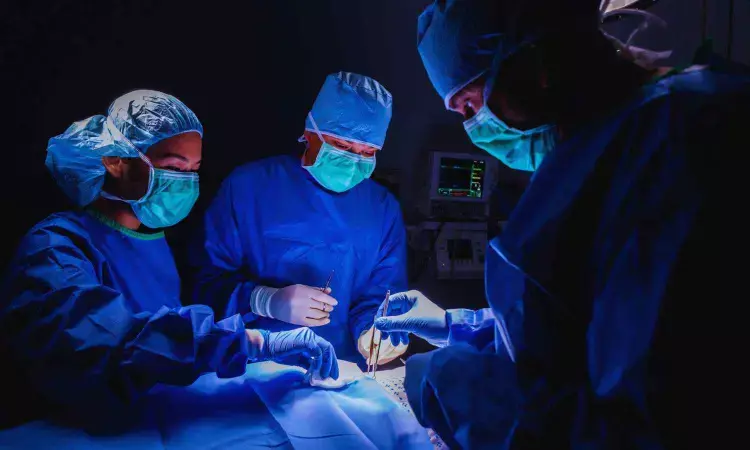- Home
- Medical news & Guidelines
- Anesthesiology
- Cardiology and CTVS
- Critical Care
- Dentistry
- Dermatology
- Diabetes and Endocrinology
- ENT
- Gastroenterology
- Medicine
- Nephrology
- Neurology
- Obstretics-Gynaecology
- Oncology
- Ophthalmology
- Orthopaedics
- Pediatrics-Neonatology
- Psychiatry
- Pulmonology
- Radiology
- Surgery
- Urology
- Laboratory Medicine
- Diet
- Nursing
- Paramedical
- Physiotherapy
- Health news
- Fact Check
- Bone Health Fact Check
- Brain Health Fact Check
- Cancer Related Fact Check
- Child Care Fact Check
- Dental and oral health fact check
- Diabetes and metabolic health fact check
- Diet and Nutrition Fact Check
- Eye and ENT Care Fact Check
- Fitness fact check
- Gut health fact check
- Heart health fact check
- Kidney health fact check
- Medical education fact check
- Men's health fact check
- Respiratory fact check
- Skin and hair care fact check
- Vaccine and Immunization fact check
- Women's health fact check
- AYUSH
- State News
- Andaman and Nicobar Islands
- Andhra Pradesh
- Arunachal Pradesh
- Assam
- Bihar
- Chandigarh
- Chattisgarh
- Dadra and Nagar Haveli
- Daman and Diu
- Delhi
- Goa
- Gujarat
- Haryana
- Himachal Pradesh
- Jammu & Kashmir
- Jharkhand
- Karnataka
- Kerala
- Ladakh
- Lakshadweep
- Madhya Pradesh
- Maharashtra
- Manipur
- Meghalaya
- Mizoram
- Nagaland
- Odisha
- Puducherry
- Punjab
- Rajasthan
- Sikkim
- Tamil Nadu
- Telangana
- Tripura
- Uttar Pradesh
- Uttrakhand
- West Bengal
- Medical Education
- Industry
Children fast from clear liquids much longer before surgery than guidelines recommend, large study shows

Most children-including nearly 80% of infants-go without clear liquids before surgery for at least twice as long as guidelines recommend, according to an analysis of data on more than 70,000 children presented at the ANESTHESIOLOGY® 2025 annual meeting.
Healthy infants and children may safely drink clear liquids, including water, fruit juices without pulp and carbohydrate-containing beverages, until two hours before receiving anesthesia, according to guidelines from the American Society of Anesthesiologists (ASA). The guidelines recommend that children not drink anything within two hours before the procedure to reduce the risk of liquid entering the lungs, which could cause choking or pneumonia. However, fasting longer can be harmful because it may cause dehydration, as well as unhealthy changes in blood sugar and other chemicals in the body.
“Prolonged fasting from clear liquids of four hours or longer can be uncomfortable and increase thirst, anxiety, pain, nausea and vomiting,” said Alexander Nagrebetsky, M.D., M.Sc., senior author of the study and an anesthesiologist and intensivist at Massachusetts General Hospital, Boston and assistant professor at Harvard Medical School, Cambridge, Massachusetts. “It can be harmful too. Children and infants are especially vulnerable to dehydration and calorie loss, which may heighten stress and slow recovery from surgery.”
Researchers reviewed records from 71,835 children, aged 17 or younger (3,771 of whom were infants younger than 1 year old), who had elective surgery at one of 12 U.S. hospitals between 2016 and 2024. In the study, prolonged fasting was defined as fasting from clear liquids for four hours (or longer) before surgery, which is two times longer (or more) than guidelines recommend.
Overall, the proportion of children who fasted from clear liquids for at least two times longer than recommended before surgery decreased from 84.3% in 2016 to 70.2% in 2024, but increased in infants, from 75.9% in 2016 to 79.6% in 2024.
The median length of time all children fasted from clear liquids decreased overall from 10.9 hours in 2016 to 8.7 hours in 2024. However, there was no significant improvement in infants, who fasted a median of 6.7 hours in 2016 and 6.3 hours in 2024. In 2024 alone, the median duration of clear liquid fasting was three times longer than the recommendation in infants and four times longer in all children.
While the study didn’t address why parents and health care professionals withheld clear liquids from children for longer than recommended, there are likely several reasons: parents and physicians may be following outdated practices of prolonged fasting (e.g., nothing to drink after midnight); lack of awareness of ASA fasting guidelines that note “efforts should be made to allow clear liquids in healthy children as close to two hours before the procedure as possible;” and a lack of understanding that prolonged fasting can increase complications and negatively impact recovery.
Perioperative team members should encourage patients to drink water and liquids with sugar for up to two hours before the procedure when appropriate, said Dr. Nagrebetsky. Parents should advocate for their children and ask their anesthesiologist about current recommendations for clear liquids before the procedure, he said.
“The study confirmed our hypothesis that non-adherence to ASA fasting guidelines is common in the U.S.,” said Ethan Lowder, B.A., lead study author and a student at Harvard Medical School. “Drinking sugar-containing clear liquids such as juices or those with electrolytes provides water and calories that children’s bodies need for normal functioning, including dealing with the stress of surgery and recovery.”
Dr Kamal Kant Kohli-MBBS, DTCD- a chest specialist with more than 30 years of practice and a flair for writing clinical articles, Dr Kamal Kant Kohli joined Medical Dialogues as a Chief Editor of Medical News. Besides writing articles, as an editor, he proofreads and verifies all the medical content published on Medical Dialogues including those coming from journals, studies,medical conferences,guidelines etc. Email: drkohli@medicaldialogues.in. Contact no. 011-43720751


